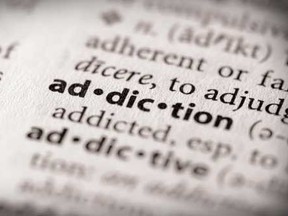Addiction has far-reaching impact

Article content
Guilt. Fear. Anger. Hurt. Concern. Shame. Embarrassment. These are just a few of the feelings individuals may experience when someone in their family unit is suffering from addiction or alcoholism.
Rebecca Hare, a registered psychotherapist, states that in her experience the entire family system is immensely affected by the individual’s disease. Hare works with individuals and families of addiction and observes that many family members are living in the addict’s world, losing all sense of self, always waiting for what would come next and try to stay one step ahead.
“Doing damage control for the addict’s, alcoholic’s life, becomes their life,” notes Hare.
Nancy Gallagher, founder of the Codependent Family Program at Westover Treatment Centre in Thamesville, says that often the family members are equally affected by the addiction as the addicts themselves. Addicts and alcoholics are affected physically, mentally, emotionally and spiritually by their disease. The family is affected in the same manner.
“The members that live with or have lived with addiction often don’t believe their life becomes so deeply entwined by the behavior of the addict; they can lose their own identity and often feel helpless, confused and hurt.”
Family members often don’t know what to do anymore.
“Until they are able to lift the fog and recognize how they have been impacted, they often lose themselves, developing unhealthy behaviors through their own confusion and often becoming ashamed of themselves,” notes Gallagher.
The family member’s thinking becomes distorted, trying to force solutions that just aren’t going to work. And while the alcoholic drinks to cope and the addict uses, the family member uses control to cope with their life even though they are often feeling very out of control.
“Almost every family member I have worked with speaks of being in denial at first,” said Hare, director of Addiction Program at Dr. Svecs Rehabilitation Clinics.
Jill Doe (not real name) remembers when she called a treatment centre to get help for her husband’s drug addiction issues. She recalls telling the counsellor that her husband was a daily user and he was acting very crazy. She informed them they he had called her 12 times that day from his work as he was paranoid of what she was doing at home without him. The treatment centre staff suggested that perhaps Jill should get some help through their codependency program at the addiction centre. In denial at the suggestion that she needed help, Jill angrily said to the person on the other end of the phone, “You are not listening to me! He is the one with the drug problem and he is the one that is paranoid and crazy!”
Jill believes they had heard this exact conversation before as the counsellor calmly queried, “Who is crazier and needs help more, the person that calls 12 times paranoid or the person that answers 12 times defending and denying?”
Jill went to a six day stay at a co-dependency program, attended Al-Anon and got support through private counseling.
“I learned about addiction but more so I learned about my own personality and my role in the dance of destruction. I was given tools to change, cope and live in a more peaceful way, despite what was going on around me.”
Addiction and alcoholism is not an individual disease. It affects all who step into its energy, voluntarily or otherwise. It is a family disease.
Many suffer within the alcoholic or addict home, blaming themselves, wondering what they did to cause behaviors, attempting to control uncontrollable situations, enduring and experiencing intense mood swings, and walking on eggshells wondering if this is going to be a good or a bad day. They begin to live the life of someone else, their mood and behavior determined by another’s actions.
Boundaries and self-identity are dissolved, often leaving more room for the manipulation and chaos of the disease to interweave into their worlds. Thinking they are acting out of love but in denial, this combination often leads to further enabling and codependency. Relationships deteriorate as resentments and hurt gain strength within the tight grip of this disease.
Rebecca Hare states, “the whole system crumbles until the family is able to receive support and understand the disease. Support systems and professional help is a key. Having a third party help you to understand what is happening, that it's not your fault and how to cope is crucial to the family getting through the process.”
Al-Anon was founded in 1951, based on the 12 step model of AA. It is a recovery group for family members. There are 24,000 meetings in over 130 countries. However, Gallagher says funding for this area of addiction is being highly neglected.
“Thunder Bay and Westover Treatment Centre are the only substantial family treatment programs in Ontario currently. We need more.”
Millions of people are affected by the disease of addiction. There is hope, strength and serenity available for all, including the family members.
If you or someone you know are affected by someone else’s addiction or alcoholism, please see some of the resources below.
Next week’s article will be the final in this series discussing the effects on the children and how they grow up.
Online resources are available at al-anon.org, www.drsvec.com, and westovertreatmentcentre.ca.
(If you would like to see an article on a specific topic, please email kelly@indigolounge.ca)